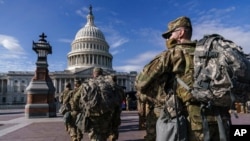U.S. security officials warn ongoing anger over the outcome of the recent presidential election, as well as other grievances, could fuel new violence across the country in the coming weeks and months.
The Department of Homeland Security on Wednesday issued a National Terrorism Advisory System (NTAS) Bulletin, cautioning that a “heightened threat environment” was likely to persist through the end of April.
“Violent riots have continued in recent days and we remain concerned that individuals frustrated with the exercise of governmental authority and the presidential transition, as well as other perceived grievances and ideological causes … could continue to mobilize,” DHS said in a statement, not giving any details.
The bulletin further warned that violent domestic extremists “may be emboldened by the Jan. 6, 2021, breach of the U.S. Capitol in Washington, D.C., to target elected officials and government facilities.”
Officials said the decision to issue the bulletin was made after consultation with the country’s intelligence and law enforcement agencies. Despite the concern, DHS said it “does not have any information to indicate a specific, credible plot.”
Federal officials warned of the potential for violent protests in all 50 U.S. states ahead of President Joe Biden’s inauguration last week, but there were only a smattering of arrests.
Officials arrested two people in Washington on January 11 after as protesters interrupted the opening of that state’s legislative session despite the presence of National Guard troops.
Days earlier, some protesters in Washington broke away from a rally and managed to breach security at the governor’s mansion, getting to the front door before they were stopped.
California authorities also arrested about a dozen people earlier this month during a rally for then-President Donald Trump outside the state Capitol.
And on Tuesday, federal prosecutors announced charges against a 43-year-old California man for the possession of pipe bombs and enough material to make more.
Investigators said Ian Benjamin Rogers sent text messages on his phone that indicated he believed Trump had rightfully won the presidential election and that he was planning to launch attacks against Democratic politicians or officials.
The criminal complaint also stated investigators found evidence linking Rogers to an anti-government, pro-gun group known as the “Three-Percenters.”
U.S. military and police agencies in Washington have been warning of an ongoing threat.
On Monday, the U.S. Army announced it would be keeping about 7,000 National Guard troops in the nation’s capital through at least mid-March, citing concerns surrounding several high-profile events, including Biden’s upcoming address to a joint session of Congress, the Trump impeachment trial and the annual March for Life.
"We are posturing our forces to respond to those threats should they occur," acting Army Secretary John Whitley said, pointing to discussions with the U.S. Secret Service, U.S. Capitol Police and the Washington Metropolitan Police Department.
"They're concerned there could be situations where there are lawful protests ... that could either be used by malicious actors or other problems that could occur," he added.
Officials also said the National Guard — part-time soldiers who can be deployed overseas but who are often called upon to help with emergencies in their home states — would be armed as needed and would help provide security, as well as help local forces with communications and crowd control.
Officials with the Federal Bureau of Investigation have also voiced concern about ongoing threats from domestic extremists.
“There's a lot of rhetoric," Steven D'Antuono of the FBI’s Washington Field Office told reporters Tuesday. “We are trying to separate the aspirational versus the intentional.”
The FBI says it has identified more than 400 suspects from the January 6 siege of the U.S. Capitol. Prosecutors say more than 150 people have been charged with crimes, all of them involving what they described as “significant felonies.”
Some former officials said Wednesday that the latest alert should persuade lawmakers to move faster on some of Biden’s Cabinet appointments, including that of homeland security secretary nominee Alejandro Mayorkas, who has yet to be confirmed.
"All of this goes to show why President Biden needs to have the members of his security and law enforcement teams in place now,” said former DHS Secretary Janet Napolitano. “Delay doesn't benefit anyone and it certainly doesn't benefit the safety and security of the American people.”
"We have to be candid and face what the real risk is,” Michael Chertoff, who served as secretary of homeland security under former President George W. Bush, told reporters Wednesday.
"This is a national problem,” he said. "What we've seen in the last couple of months is attacks by these right-wing extreme groups not just on the federal government here in Washington, but on state capitals.”
The White House has also expressed concern about domestic extremism, announcing Friday that it had requested a comprehensive threat assessment from U.S. intelligence agencies stemming from the Capitol siege.
“The tragic deaths and destruction that occurred underscored what we have long known — the rise of domestic violent extremism is a serious and growing national security threat,” press secretary Jen Psaki told reporters.
“We want fact-based analysis,” Psaki said, adding the administration “will confront this threat with the necessary resources and resolve."







